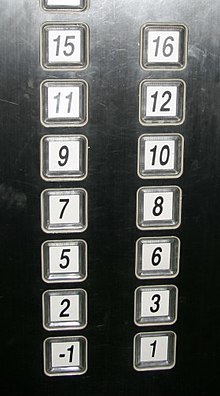Tetraphobia
| pronunciation | ||
|---|---|---|
|
四 "four" |
死 "death" |
|
| Mandarin | sì | sǐ |
| Wu ( Shanghai ) | sy 2 | sy 2 , shi 2 |
| Cantonese | be 3 | be 2 |
| Hakka | si | si |
| Min Nan ( Taiwanese ) | sì, sù | sí, sú |
| Japanese | shi | shi |
| Korean | sa | sa |
| Vietnamese | tứ | tử |
Tetraphobia (from Greek τετράς - "tetras" = "four" and φόβος - fóbos = "fear, fear") describes the superstitious fear of the number 4, which is particularly common in East Asian ( China , Taiwan , Japan , Vietnam , North and South Korea ) as well as in the Southeast Asian ( Singapore , Malaysia ) area is widespread.
Tetraphobia in Asia
China, Hong Kong and Taiwan

In Chinese there is the word 四 ( Pinyin : "sì"; Jyutping : "sei 3 ") for the number 4, which in many variants of this language is very similar to the word 死 (Pinyin: sǐ ; Jyutping: sei 2 ; dt. : Death ). Similarly, there are words for the number 4 in the vocabulary of Japanese ( shi or よ ん (yon)), Korean (사, sa ) and Vietnamese (tư), which can equally stand for "death".
Therefore, in these cultures (especially in China) during festive days or when a member of the family falls ill, care is taken to avoid the occurrence of this number in any form; 14, 24 and 42 should not appear either, since these also contain the number “4”. In both public (hotels, office buildings, etc.) and private buildings (residential buildings) these floor numbers are skipped in the above countries; Table numbers 4, 14, 24 and 42 are handled in the same way at family celebrations (such as weddings, birthdays) or other social events. Similarly, in large residential complexes, block numbers such as 4, 14, 24 etc. are avoided by substituting them with 3A, 13A, 23A etc.
In the Cantonese-speaking part of China, the 14 and 24 are viewed as even more ominous than the 4 itself: 14 denotes "certain death", while 24 means "easy to die".
In Hong Kong there are buildings such as Vision City and The Arch (the latter in Kowloon , Union Square ), in which all floors from 40 to 49 have been left out: after 39 / F follows directly 50 / F, which is something for tourists who do not like the tetraphobia of Asians is known, sometimes causes some confusion. The fourth was also skipped in the case of the Sorrento residential complex towers in the aforementioned Union Square. In addition, in Hong Kong (as in Singapore) both 13 (see also triskaidekaphobia ) and 14 can be left out of the numbers of the floors - due to the mixing of Western and Asian cultures .
China also expresses tetraphobia militarily: The first type number of Shenyang fighter aircraft is a 5: Shenyang J-5 . The navy of the Taiwanese and the South Koreans, whose ships never receive the ship identifier 4, proceed in a similar way .
Japan
In Japan , the number 4 is omitted from most homes and parking lots. Similar to the western influences in Hong Kong and Singapore described above - in line with western tradition - the 13th floor is skipped. (In hospitals, the number 9 is also avoided, since the syllable くku [an alternative reading for き ゅ うkyū ] reminds of the word 苦 し むkurushimu , “suffer, suffer”.) 49 is regarded as a particularly ominous number because it in Japanese fragmentarily refers to the expression 死 ぬ ま で 苦 し むshi nu made ku rushimu , which translated means something like “suffering to death”.
If use is made of the 4 anyway, it is almost always pronounced in common parlance, according to the Japanese Kun reading of the Kanji 四 , yo or yon , while the Sino-Japanese shi is avoided; even in compound words in which the on reading is normally used for all other kanji (including all numbers) according to the current rules. So z. B. "four people" (Kanji: 四人 ) is not referred to as shinin , but yonin , in order to avoid confusion or associations with 死人 shinin (dt. "Dead (r)").
North and South Korea
Although tetraphobia is less extreme in North and South Korea, the skipped "4" is almost always found in hospitals and other public buildings; In private buildings, however, the letter "F" (English four ) stands for the number "4". Apartment numbers that contain the number "4" several times (such as 404) are also avoided. It is known from reports on the state-owned railway company Korail that a series of locomotives numbered "4401" upwards made an intended jump from 4443 directly to 4445.
Tetraphobia outside of Asia
Italy
A similar superstition is widespread in some parts of Italy. The number 4 is said to symbolize a coffin and thus bring bad luck; on the other hand, it stands for “the secret of everything and nothing”.
See also
- Triskaidecaphobia (fear of the number 13)